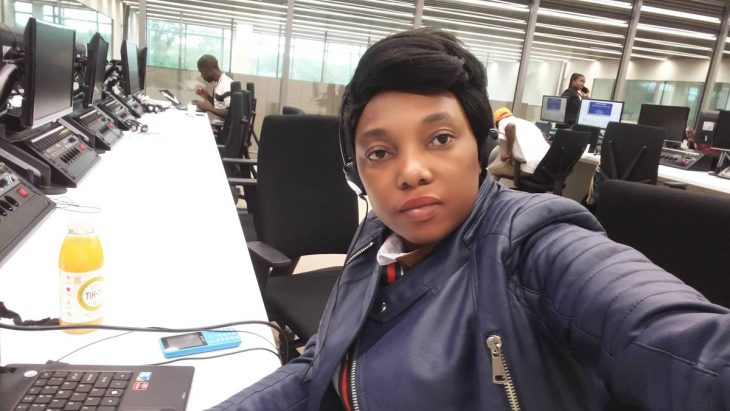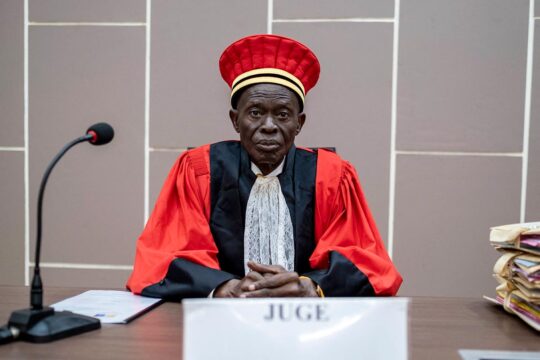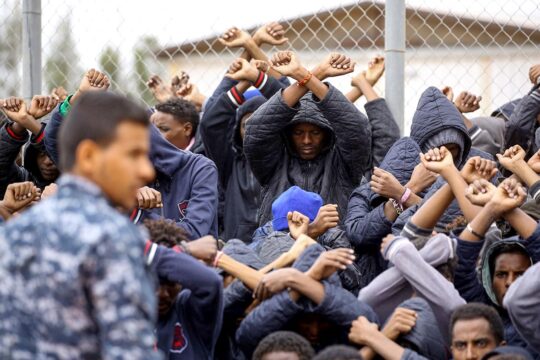“The experience was as exciting as it was stressful”, says Inès Laure Ngopot, a young Central African journalist sent to The Hague to cover the hearings for Radio Ndeke Luka, a media of the Hirondelle Foundation. Back in Bangui, she agreed to give JusticeInfo.net her personal impressions.
Arrival in The Hague
"The work of a journalist who has never covered an international court is often full of stress and the fear of not respecting the principles of international law. This was my case as I arrived in The Hague more than a week ago for the confirmation of charges hearing [of Alfred Yekatom and Patrice-Edouard Ngaïssona] before the International Criminal Court (ICC), invited by Free Press Unlimited and Journalists For Justice to follow closely and experience the atmosphere of this hearing.”
Ghost Prosecutor
"My first surprise was that from the start to the end of this hearing, ICC Prosecutor Fatou Bensouda was not present. Because at the national level, in the case of a criminal session for example, the Attorney General at the Court of Appeal in any of the three regions always takes part in the conduct of the trial until the end. A meeting of less than 10 minutes between Bensouda and the Central Africans only allowed Central African journalists to get an 18-second statement addressed to the victims.”
Strong defence
"On the defence side, I find that the counsel for each suspect defends himself as best he can, but since the case was joined on 20 February this year and since I do not know the full mechanism of the ICC's functioning, I thought the defence of the two suspects would stand alone.”
Polished debates…
"Covering this confirmation of charges hearing before the ICC was very helpful in developing me as a court reporter. During the hearing, I thought that the lawyers would raise their voices among themselves and against the prosecutor's office, as is often the case in CAR between the defence and the prosecution. But here, maybe since it's not the trial itself, people are calm..."
… but words that can fuel hatred
"We Central African journalists are aware of our role in relation to the public. As the country is in the post-conflict stage, we must avoid fueling hatred among our listeners or readers. During this hearing, the judges, the prosecutor's office and the defence used a lot of harsh language, which could have a negative impact on the public. For example, they talked of ‘throat slitting’, of a ‘Muslim population that was massacred by Anti-Balaka’, a ‘religious’ conflict, etc. These are words that we Central African journalists cannot convey as such. We try to say it in a different way while keeping the idea. Because the Central African conflict is not religious, it's more a conflict of interest. When the parties to the trial say, for example, ‘PK5 Muslims’, we try to say “PK5 civilian population”, knowing that in PK5 [a district of Bangui] there are both Muslims and non-Muslims.”

Francophones neglected
“This hearing, which concerns the Central African Republic, a French-speaking country, should take into account the aspect of language. We Central African journalists were very disappointed when some important documents for our articles were only in English. This has made our work very difficult.”
Too many closed doors
“Also, while the Court has a beautiful courtroom, it is unfortunate that some hearings are held in camera. This is really a loss for our listeners and readers and especially for the victims who expect a lot from the outcome of this hearing.”
Unexplained restrictions
“As a Central African journalist, I think the Court should explain to the media why some people should not be interviewed, for example the wives of suspects. None of them agreed to an interview and they later told us that they were forbidden to speak to the media.
When a hearing is public in the Central African Republic, it means that the media can film, take pictures and record the proceedings. But it is quite the opposite at the ICC. We must limit ourselves to note-taking and interviews with the parties to the trial.”
The lawyer’s wife
“Another thing that caught my attention was the involvement of the wife of Geert-Jan Alexander Knoops, Patrice-Edouard Ngaïssona's main counsel. She is a lawyer, but since she is not part of the defence team, what gives her the right to represent her husband as she did? Why not choose another member of the defence team? Ms. Knoops even stopped a national language interview with Timoléon Kokongo, one of Ngaïssona's Central African lawyers, on the grounds that her husband did not understand Sango. She seems unaware that this hearing concerns the Central African population, some of whom do not understand either English or French.”
"Tomorrow, if I go back to The Hague to cover another trial, I know I will benefit from this first stressful experience," concludes Inès Laure Ngopot.
All her reports (in french) produced in The Hague are available on the website of Radio Ndeke Luka at the following links:
- Que savoir d'une audience de confirmation des charges ?
- Justice : Ouverture à la CPI de l'audience de confirmation des charges dans l'affaire le Procureur contre deux suspects centrafricains
- Justice : audience de confirmation des charges dans l'affaire le Procureur contre Alfred Yékatom Rombhot et Patrice-Edouard Ngaïssona, la défense déplore des vices de procédures
- La défense inquiète à l'ouverture de l'audience de confirmation des charges contre les suspects Patrice Edouard Ngaïssona et Alfred Yékatom Rombhot à la Haye au Pays-Bas
- Justice : L'audience de confirmation des charges contre Ngaïssona et Yékatom suspendue pour deux semaines






